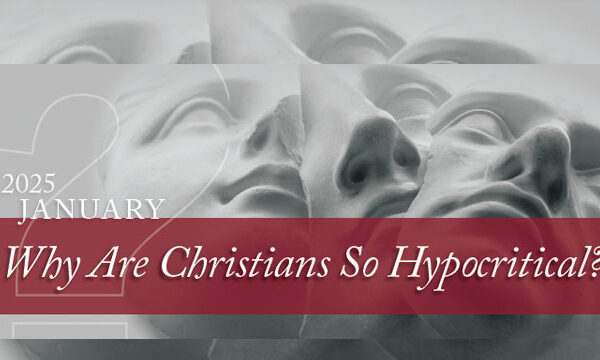Back to series
How Will They Know?

Recommended Reading:

How Will They Know?
They Will Know Them by Their Love
Click here to open a Print - Friendly PDF
One time, on a train ride from Vienna, Austria, to Budapest, Hungary, my wife and I were sitting in a car with four others. Two were atheists, and the other two had at least some connection in their background to the church. As we talked, my wife found out that one was a believer who was related to a prominent leader in the Christian community who faced many difficult struggles. This led to the subject of the difficulty of relationships and the unique way Christ calls us to forgive and to love. One of the atheists, a young man, shared his desire for a loving marriage and family and asked, “Can’t atheists love and forgive?” I responded, “Yes, of course atheists can love and forgive but not because of their atheism.” There ensued a lengthy discussion that went along these lines: in the atheist perspective all is matter. There is no God, no solid basis for moral values (other than my own individual and community preference), and no source for the other-centered (“agape”) love that Christ embodies and teaches his followers to practice.
 Atheism leads inevitably to a grim meaningless universe. It encourages autonomy rather than love. Atheist Bertrand Russell held that as a result of his denial of God’s existence, we need to build our lives on the basis of “unyielding despair.” Fellow atheist and existential philosopher Albert Camus said that the only really serious question is whether or not to commit suicide. Fyodor Dostoyevsky has one of his characters argue that if there is no God, everything is permitted. Another atheist, Jean Paul Sartre, said that no finite point had any meaning without an infinite reference point. He believed that there is no infinite reference point; therefore, life is meaningless. He said, whether you choose to help an old lady across the street or beat her on the head, just be authentic. Where in atheism is there a basis or motive for love and forgiveness? If anything, atheism seems to undermine love and forgiveness. Certainly, atheists often love their spouses, children, and others, but not because this is encouraged by or a necessary consequence of their atheism.
Atheism leads inevitably to a grim meaningless universe. It encourages autonomy rather than love. Atheist Bertrand Russell held that as a result of his denial of God’s existence, we need to build our lives on the basis of “unyielding despair.” Fellow atheist and existential philosopher Albert Camus said that the only really serious question is whether or not to commit suicide. Fyodor Dostoyevsky has one of his characters argue that if there is no God, everything is permitted. Another atheist, Jean Paul Sartre, said that no finite point had any meaning without an infinite reference point. He believed that there is no infinite reference point; therefore, life is meaningless. He said, whether you choose to help an old lady across the street or beat her on the head, just be authentic. Where in atheism is there a basis or motive for love and forgiveness? If anything, atheism seems to undermine love and forgiveness. Certainly, atheists often love their spouses, children, and others, but not because this is encouraged by or a necessary consequence of their atheism.
Throughout the conversation on the train, the young man followed each point and admitted that he had never thought about this before. I went on to point out that love is at the core of Jesus’ message. We live in a universe where personality is valued (not just impersonal matter). God is personal, in fact tri-personal—Father, Son, and Holy Spirit. Personality is at the core of the cosmos. The members of the Trinity are in an eternal relationship of love. So love and relationship are also at the center of reality. God has made us in His image. We are given worth, value, and dignity that can never be taken away from us. Furthermore, we are made in the likeness of God to express our God-given personalities, engage in relationships, and love God and other people.
Jesus places love at the very center in His summation of the Old Testament law. When asked which is the greatest commandment, Jesus replies, “You shall love the Lord your God with all your heart, and with all your soul, and with all your mind” (Matthew 22:37). Then He quickly adds, “You shall love your neighbor as yourself” (Matthew 22:39). On another occasion, Jesus gives an additional exhortation, “A new commandment I give to you, that you love one another, even as I have loved you, that you also love one another” (John 13:34). He goes on to make this kind of love the mark of discipleship—the evidence and confirmation by which people can know that these are His followers: “By this all men will know that you are my disciples, if you have love for one another” (John 13:35).
Jesus even goes so far as to say, “Love your enemies and pray for those who persecute you” (Matthew 5:44). He also calls us to radical forgiveness—to forgive “seventy times seven” (Matthew 18:22). Not only does He say that if you forgive you will be forgiven, but he also says, “If you do not forgive others, then your Father in heaven will not forgive your transgressions” (Matthew 6:14- 15).
On the train, after giving a summary of the above, I asked the young man, “Which view do you think gives an adequate basis for love and forgiveness, your atheism or faith in Christ?” He readily admitted that it wasn’t his atheism and seemed fascinated by these new insights. At that moment we arrived at the border of Hungary, where this man found out that as a Canadian he needed a visa to enter the country (Americans didn’t need one), so the border guards escorted him off the train. We made plans to meet him at a certain time in Budapest the next day, but he didn’t make it. I’ve often wondered what happened to this honest, open young atheist.
Some atheists hold to a kind of humanism. Though they agree that our origin is out of matter, time, and chance, and though our destiny is oblivion (no life after death), somehow people are significant. You might diagram it like this:

Some atheists say that our origin is insignificant, our destiny “full of sound and fury signifying nothing,” and that people are merely a “useless passion” (Sartre). In fact, Sartre wrote in his play No Exit, “Hell is other people.” For an atheist, human origin, existence, and destiny are nothing but big zeros.
Humanists, on the other hand, being atheists, contend that we emerged spontaneously out of the cosmic slime, and even the noblest person rots in the grave. Yet somehow humans are a great big plus. But humanists have no basis for giving humans dignity. Perhaps they know in their consciences, the law written on their hearts (Romans 2:14-15), that this is so. Yet they give no sufficient reason why we ought to treat humans with such value. Psychologist Erik Erickson once made the comment that he could think of no other reason to give humans dignity than that they are made in the image of God. In any case, there seems to be no intrinsic basis for an atheist to encourage love and forgiveness.
Christianity argues that God is the origin of life and we are made in His image; therefore, we have intrinsic worth and dignity based not on what we do but on who we are. Because of a loving Creator, we have value, our lives matter, and our destiny is eternal, either for salvation or for judgment.
Atheists find no solid basis for love in a universe where “all is matter.” Followers of New Age spirituality find no firmer foundation for love in a universe where “all is spirit.” There are many forms of Hinduism and Buddhism. I will be focusing on what might be called absolute pantheism as exemplified in the Hindu philosopher Shankara and others holding a similar view. This perspective, as it has come through to the New Age movement in the west, holds that “all is One.” Marilyn Ferguson in her classic book, The Aquarian Conspiracy, points out that the negative way to express this positive principle is “non-distinction.”1 There are no real distinctions anywhere. Matter, time, space, cause and effect are all illusory. A second related principle is that “you are divine.” Since you are part of the “One,” you are in a sense “god” or “divine.” A third implication of this view is that the purpose of our existence is to “alter consciousness” so that we come to see that there are no real distinctions in this world. We need to transcend this illusory world and realize that “All is One.” Only then will we be able to achieve “unlimited power” to create our own reality. The only limit to what we can do is our own imagination. Note that the “One” is not a “personal” being but an impersonal force—an “it” rather than “he” or “she.”
 Other recent advocates reaffirm this same All is One (non-distinct) philosophy. For instance, Deepak Chopra says in his bestseller, The Seven Spiritual Laws of Success, “The physical universe is nothing other than the Self curving back within Itself to experience Itself.”2 In the same context, he said that there are “seeds of divinity within us” and that we are “divinity in disguise.”3 In Chopra’s book, Ageless Body, Timeless Mind, he agrees with an Indian teacher who said: As is the microcosm, so is the macrocosm.
Other recent advocates reaffirm this same All is One (non-distinct) philosophy. For instance, Deepak Chopra says in his bestseller, The Seven Spiritual Laws of Success, “The physical universe is nothing other than the Self curving back within Itself to experience Itself.”2 In the same context, he said that there are “seeds of divinity within us” and that we are “divinity in disguise.”3 In Chopra’s book, Ageless Body, Timeless Mind, he agrees with an Indian teacher who said: As is the microcosm, so is the macrocosm.
As is the atom, so is the Universe. As is the human body, so is the cosmic body. As is the human mind, so is the cosmic mind.4 Andrew Weil has emerged in the alternative medicine field and, after years of obscurity, made the cover of Time magazine (May 12, 1997). He also echoed this all-is-one perspective. He said in Natural Health, Natural Medicine, “All religions and spiritual traditions stress the importance of overcoming the illusion of separateness and experiencing unity.”5 Weil, like Chopra, was educated in medicine and applies his philosophy to issues of health.
Gary Zukav, who like Chopra was given extensive national publicity by appearing on the Oprah Winfrey show, also holds the belief that all is one. In his popular book, The Seat of the Soul, he said, “Physical reality and the organisms and forms within physical reality are systems of Light within systems of light, and this Light is the same Light as the Light of your soul.”6 The ancient Hindu way of saying the same thing is “Atman is Brahman”—the individual is one with the divine.
During a long dinner conversation with a senior researcher from a large New Age think tank, we discussed the idea of this impersonal force. For fifteen years this man had been deeply immersed in Eastern philosophy—researching, writing, and advising radio and television specials on New Age topics. He came to me because he was considering returning to his roots (being brought up in a Christian church). One reason he gave for this desire was that he couldn’t find a “home” in any of the Eastern philosophies. He had tried them all and found that they didn’t fit what he had discovered about the universe. Above all, he had met all the top Eastern gurus and New Age advocates and was profoundly disappointed. They were all so “narcissistic.”
I explained to him that the thrust of New Age philosophy is “inward” (to the divine within), or “upward” (to merge your identity with that of the One), but definitely not “outward” (to a distinct world that is illusory). I asked why they would be motivated to care a great deal about distinct people and things that their philosophy regarded as illusory. He quickly agreed that if they were true to their philosophy, they would not.
Recently, I asked a college professor (let’s call her Susan), who had been for many years a strong advocate of the New Age perspective, why she would talk about love, given her former view. She said that she would have answered that we need to love “being” in general (“the One”). But when I asked her if this love applied to particular, distinct (illusory) things, she admitted that she wouldn’t have had an answer for that question. She said that the disconnect between her idea of love and the inability to practice it even on a small level never occurred to her.
Tal Brooke, president of Spiritual Counterfeits Project based in Berkeley, California, spent a number of years in India being groomed to be a Western spokesman for Sai Baba, the guru of gurus in India. Sai Baba is the guru most respected by those in the New Age spirituality. He is the one that many other gurus visit to be blessed. Thousands go to even catch a distant glimpse of him, for he is known as the “miracle”-working guru because of the many stories of his powers that have been passed around. Tal had numerous private audiences with Sai Baba.
During his time in India, Tal met a missionary couple, and he tried using his brilliant mind and his logical skills to convert them to Hinduism. They put some dents in his arguments. However, what he noticed about them over time was that they really seemed to care for him more than they did for themselves. Later he described this as other-centered, (“agape”) love. Though the other Hindu disciples were gentle, Tal noticed that they lacked this quality. Above all, after numerous private audiences with Sai Baba, Tal noted that the guru also utterly lacked this other-centered love. He was beginning to understand what the Apostle John meant when he said, “How will they know that these are disciples of Jesus? They will know them by their love” (John 13:35, paraphrased).
Note the context of this last statement. Jesus says in verse 34: “A new commandment I give to you, that you love one another even as I have loved you.” Underline the fact that this is a commandment which believers in Jesus are to obey. This, of course, implies that it is possible to disobey that charge. In other words, it is not automatically true that believers in Jesus will be loving. They could be disobedient to what Jesus asks of them. The radical nature of the love required, to love “as I have loved you” is stunning. Jesus gave His life for those who were in rebellion to the God He served. This self-sacrificial (agape) love is to be the indicator that one is a follower of Jesus. Also, note that in verse 35, the way people will know that believers are disciples is “by” their love “if” and only if they love one another.
7When those who bear the name of Christ fail to demonstrate God’s love, people are often hurt in the process and feel justified in unbelief. That emotional pain caused by Christians becomes an obstacle to even being able to consider who Jesus is. At a retreat center with top New Age and evangelical leaders, I had the opportunity to engage in discussions about this subject and how they viewed Jesus in light of it. After a few days, the final person to share was the wife of one of the most prominent New Age advocates. She shared that because of what some Christians had done to her fifteen years earlier (she didn’t say what it was), for fifteen years she had not been able to say the name of “Jesus Christ.” When she said that name, she broke down and wept uncontrollably. She thanked me and others present for freeing her to be able to consider who Jesus was and for the first time in a long time to say His name.
 As I have traveled around the United States and overseas interacting with believers and nonbelievers, certain common themes have emerged. First, many people desire passion, a passionate commitment to something or someone. Second, many also desire a mentor who exemplifies love and shows them a good way to live. Third, many people crave a perspective that is comprehensive enough to make sense of personal and public life.
As I have traveled around the United States and overseas interacting with believers and nonbelievers, certain common themes have emerged. First, many people desire passion, a passionate commitment to something or someone. Second, many also desire a mentor who exemplifies love and shows them a good way to live. Third, many people crave a perspective that is comprehensive enough to make sense of personal and public life.
Often they have not found what they desired in the church. Many desired passion but found in their churches coldness or lack of emotion. They desired a mentor who embodies truth and love and were disillusioned by hypocrisy and lovelessness. Despite their desire for a perspective that made sense of things, sometimes what they encountered in their churches was narrow in scope and ineffectual to answer the questions they were asking. They desired passionate commitment, modeling of character, and an educated conscience, but were unable to satisfy their hunger for these things.
Of course, there are plenty of exceptions to this pattern. Many believers are passionately committed to Jesus, have found a mentor, and have found solid answers to the big questions. In all these areas, love is at the center. Each one of these believers has been pulled (sometimes kicking and screaming) out of their self-centeredness and overwhelmed by God’s love for them. They have responded by passionately desiring to love Him with their whole being. They found God’s love demonstrated in what Jesus said and did for us and were motivated by His example to reach out and love others. They sought to grow in this love by finding a mentor, someone who could teach in theory and in practice this life of trust in God. They eventually desired to love God more with their minds and take every thought (in personal and public life) captive to Christ (2 Corinthians 10:5).
Theoretically, the whole message of the Gospel is saturated with love. By contrast, atheism (all is matter) and New Age spirituality (all is spirit) have no adequate basis to stimulate or sustain love at all.

My purpose is also to point those who bear the name of Christ to more truly be examples of Christ’s love. A story is told about Alexander the Great. One day the great Greek conqueror was holding court, and a young man was brought to him who was guilty of being a coward in battle, something Alexander despised. Alexander was high on his throne above the young man and asked him “What is your name?” The young man, knowing that Alexander had the power of life or death over him, was shaking and could barely speak. He answered in a trembling voice, “Alexander.”
Alexander the Great stood up from his throne and with passion asked, “WHAT IS your name?” The young man responded in an even shakier voice, “Alexander.” Alexander the Great stepped down from his throne and shouted, “What is your name?” By this time the man could hardly speak and responded in a barely audible voice, “Alexander.” Alexander the Great shouted, “Change your conduct or change your name.” We, too, must take the name of Christ with courage and care.
8Further, I want to stress the uniqueness of Christ’s love in theory and in practice. Sometimes that love is expressed in words, as in the example of the missionary couple who talked to Tal. Sometimes it is a silent love. I recently heard of a tribe in Nigeria who came to a missionary who didn’t know them. The chief said, “We all want to believe in Jesus. What do we do?” The missionary was confused and asked if someone had preached to them? They replied, “No,” but again said that the whole tribe wanted to follow Jesus. When the missionary asked, “Why?” the chief explained what had happened.
Apparently, some of those who believed in Christ had come to their village regularly over a number of years and built a school, wells, a hospital, and other things to help their village. They said no one else had done anything for them. They were attracted to the loving attitudes and actions of these believers. So, you see, there is a spoken love and a silent love. At different times both are needed.9 Love has both a theoretical and practical place in demonstrating the reality of Christ.
|
Notes: |
|||

Arthur W. Lindsley
Senior Fellow for Apologetics, CSLIArthur W. Lindsley is the Vice President of Theological Initiatives at the Institute for Faith, Works, & Economics. He has served at the C.S. Lewis Institute since 1987 both as President until 1998 and currently as Senior Fellows for Apologetics. Formerly, he was director of Educational Ministries at the Ligonier Valley Study Center, and Staff Specialist with the Coalition for Christian Outreach. He is the author of C.S. Lewis's Case for Christ, True Truth, Love: The Ultimate Apologetic, and co-author with R.C. Sproul and John Gerstner of Classical Apologetics, and has written numerous articles on theology, apologetics, C.S. Lewis, and the lives and works of many other authors and teachers. Art earned his M.Div. from Pittsburgh Theological Seminary and a Ph.D. in Religious Studies from the University of Pittsburgh.
Recommended Reading:
Francis A. Schaeffer, The Mark of the Christian (Downers Grove: IVP Classics, 2006)
 ”It is possible to be a Christian without showing the mark, but if we expect non-Christians to know that we are Christians, we must show the mark.” Too often we have failed to show the beauty of authentic Christian love. In our era of global violence and sectarian intolerance, the church needs to hear anew the challenge of this book. More than ever, the church needs to respond compassionately to a needy world. More than ever, we need to show the Mark.
”It is possible to be a Christian without showing the mark, but if we expect non-Christians to know that we are Christians, we must show the mark.” Too often we have failed to show the beauty of authentic Christian love. In our era of global violence and sectarian intolerance, the church needs to hear anew the challenge of this book. More than ever, the church needs to respond compassionately to a needy world. More than ever, we need to show the Mark.
 COPYRIGHT: This publication is published by C.S. Lewis Institute; 8001 Braddock Road, Suite 301; Springfield, VA 22151. Portions of the publication may be reproduced for noncommercial, local church or ministry use without prior permission. Electronic copies of the PDF files may be duplicated and transmitted via e-mail for personal and church use. Articles may not be modified without prior written permission of the Institute. For questions, contact the Institute: 703.914.5602 or email us.
COPYRIGHT: This publication is published by C.S. Lewis Institute; 8001 Braddock Road, Suite 301; Springfield, VA 22151. Portions of the publication may be reproduced for noncommercial, local church or ministry use without prior permission. Electronic copies of the PDF files may be duplicated and transmitted via e-mail for personal and church use. Articles may not be modified without prior written permission of the Institute. For questions, contact the Institute: 703.914.5602 or email us.
-
Recent Podcasts
From Anti-Christian to Pastor – Brian Smith’s Story
by Jana Harmon, Brian Smith on January 17, 2025Brian grew up in a small Georgia town...Read More
-
Time With God
by Aimee Riegert, J.I. Packer on January 10, 2025
-
Faith and Reason – Henare Whaanga’s Story
by Henare Whaanga, Jana Harmon on January 3, 2025
-
Recent Publications
Why Are Christians So Hypocritical?
by Christopher L. Reese on January 1, 2025Oh, the hypocrisy of those Christians—they talk so...Read More
-
How Artists and Their Art Can Point Us to the Creator
by Russ Ramsey on December 2, 2024
-
What about Jesus’s Childhood?
by Jim Phillips on December 1, 2024
0
All Booked
0.00
All Booked
0.00
All Booked
23931
GLOBAL EVENT: Sentenced to Death with Maryam Rostampour-Keller, 8:00PM ET
https://www.cslewisinstitute.org/?event=global-event-sentenced-to-death-with-maryam-rostampour-keller-800pm-et&event_date=2025-02-07®=1
https://www.paypal.com/cgi-bin/webscr
2025-02-07

Next coming event
Days
Hours
Minutes
Seconds
GLOBAL EVENT: Sentenced to Death with Maryam Rostampour-Keller, 8:00PM ET
On February 7, 2025 at 8:00 pmSpeakers

Arthur W. Lindsley
Senior Fellow for Apologetics, CSLI
Team Members

Arthur W. Lindsley
Senior Fellow for Apologetics, CSLIArthur W. Lindsley is the Vice President of Theological Initiatives at the Institute for Faith, Works, & Economics. He has served at the C.S. Lewis Institute since 1987 both as President until 1998 and currently as Senior Fellows for Apologetics. Formerly, he was director of Educational Ministries at the Ligonier Valley Study Center, and Staff Specialist with the Coalition for Christian Outreach. He is the author of C.S. Lewis's Case for Christ, True Truth, Love: The Ultimate Apologetic, and co-author with R.C. Sproul and John Gerstner of Classical Apologetics, and has written numerous articles on theology, apologetics, C.S. Lewis, and the lives and works of many other authors and teachers. Art earned his M.Div. from Pittsburgh Theological Seminary and a Ph.D. in Religious Studies from the University of Pittsburgh.




